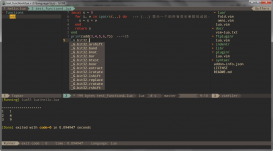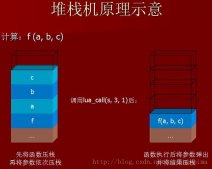这是《Lua程序设计》中提到的,但是想成功执行,对于初学Lua的确没那么简单。这里涉及如何如何生成一个动态链接库so文件;Lua5.2中导出函数从LuaL_register变成了LuaL_newlib。对于具体的细节有待深入。这里的模块名是hello_lib, Lua解释器会根据名字找到对应的模块,而后执行其中的 luaopen_XXX方法。 代码:
|
1
2
3
4
5
6
7
8
9
10
11
12
13
14
15
16
17
18
|
#include <math.h>#include <lua5.2/lua.h>#include <lua5.2/lauxlib.h>#include <lua5.2/lualib.h>static int hello_sin(lua_State *L){double d = luaL_checknumber(L, 1);lua_pushnumber(L, sin(d));return 1;}static const struct luaL_Reg hello_lib[] = {{"hello_sin" , hello_sin},{NULL, NULL}};int luaopen_hello_lib(lua_State *L){luaL_newlib(L, hello_lib);//luaL_register(L, "hello_lib",hello_lib); // lua 5.1return 1;} |
在Lua中调用:
|
1
2
|
local hello = require "hello_lib"print(hello.hello_sin(1)) |
执行过程和结果:

1. C函数作为应用程序的一部分。
|
1
2
3
4
5
6
7
8
9
10
11
12
13
14
15
16
17
18
19
20
21
22
23
24
25
26
27
28
29
30
31
32
33
34
35
36
37
38
39
40
41
42
43
44
|
#include <stdio.h>#include <string.h>#include <lua.hpp>#include <lauxlib.h>#include <lualib.h>//待Lua调用的C注册函数。static int add2(lua_State* L){ //检查栈中的参数是否合法,1表示Lua调用时的第一个参数(从左到右),依此类推。 //如果Lua代码在调用时传递的参数不为number,该函数将报错并终止程序的执行。 double op1 = luaL_checknumber(L,1); double op2 = luaL_checknumber(L,2); //将函数的结果压入栈中。如果有多个返回值,可以在这里多次压入栈中。 lua_pushnumber(L,op1 + op2); //返回值用于提示该C函数的返回值数量,即压入栈中的返回值数量。 return 1;}//另一个待Lua调用的C注册函数。static int sub2(lua_State* L){ double op1 = luaL_checknumber(L,1); double op2 = luaL_checknumber(L,2); lua_pushnumber(L,op1 - op2); return 1;}const char* testfunc = "print(add2(1.0,2.0)) print(sub2(20.1,19))";int main(){ lua_State* L = luaL_newstate(); luaL_openlibs(L); //将指定的函数注册为Lua的全局函数变量,其中第一个字符串参数为Lua代码 //在调用C函数时使用的全局函数名,第二个参数为实际C函数的指针。 lua_register(L, "add2", add2); lua_register(L, "sub2", sub2); //在注册完所有的C函数之后,即可在Lua的代码块中使用这些已经注册的C函数了。 if (luaL_dostring(L,testfunc)) printf("Failed to invoke.\n"); lua_close(L); return 0;} |
2. C函数库成为Lua的模块。
将包含C函数的代码生成库文件,如Linux的so,或Windows的DLL,同时拷贝到Lua代码所在的当前目录,或者是LUA_CPATH环境变量所指向的目录,以便于Lua解析器可以正确定位到他们。在我当前的Windows系统中,我将其copy到"C:\Program Files\Lua\5.1\clibs\",这里包含了所有Lua可调用的C库。见如下C语言代码和关键性注释:
|
1
2
3
4
5
6
7
8
9
10
11
12
13
14
15
16
17
18
19
20
21
22
23
24
25
26
27
28
29
30
31
32
33
34
35
36
37
38
39
40
41
42
43
44
45
46
47
|
#include <stdio.h>#include <string.h>#include <lua.hpp>#include <lauxlib.h>#include <lualib.h>//待注册的C函数,该函数的声明形式在上面的例子中已经给出。//需要说明的是,该函数必须以C的形式被导出,因此extern "C"是必须的。//函数代码和上例相同,这里不再赘述。extern "C" int add(lua_State* L) { double op1 = luaL_checknumber(L,1); double op2 = luaL_checknumber(L,2); lua_pushnumber(L,op1 + op2); return 1;}extern "C" int sub(lua_State* L){ double op1 = luaL_checknumber(L,1); double op2 = luaL_checknumber(L,2); lua_pushnumber(L,op1 - op2); return 1;}//luaL_Reg结构体的第一个字段为字符串,在注册时用于通知Lua该函数的名字。//第一个字段为C函数指针。//结构体数组中的最后一个元素的两个字段均为NULL,用于提示Lua注册函数已经到达数组的末尾。static luaL_Reg mylibs[] = { {"add", add}, {"sub", sub}, {NULL, NULL} }; //该C库的唯一入口函数。其函数签名等同于上面的注册函数。见如下几点说明://1. 我们可以将该函数简单的理解为模块的工厂函数。//2. 其函数名必须为luaopen_xxx,其中xxx表示library名称。Lua代码require "xxx"需要与之对应。//3. 在luaL_register的调用中,其第一个字符串参数为模块名"xxx",第二个参数为待注册函数的数组。//4. 需要强调的是,所有需要用到"xxx"的代码,不论C还是Lua,都必须保持一致,这是Lua的约定,// 否则将无法调用。extern "C" __declspec(dllexport)int luaopen_mytestlib(lua_State* L) { const char* libName = "mytestlib"; luaL_register(L,libName,mylibs); return 1;} |
见如下Lua代码:
require "mytestlib" --指定包名称
--在调用时,必须是package.function
|
1
2
|
print(mytestlib.add(1.0,2.0))print(mytestlib.sub(20.1,19)) |






